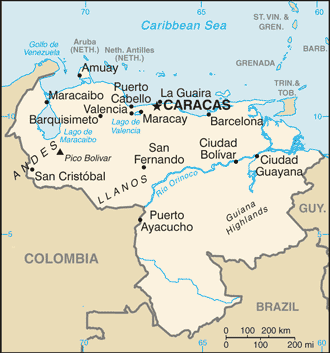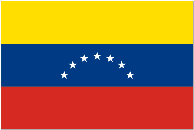Table of Contents
| Location and Size | Credit and Collections |
| Government | Risk Assessment |
| Legal System | Business Climate |
| People | Business Protocol |
| Economy | |
| Comparative Indicators |
12345
Location and Size
Venezuela is located in Northern South America, bordering the Caribbean Sea and the North Atlantic Ocean, between Colombia and Guyana. Its total area is 912,050 sq km., which is slightly more than twice the size of California.
Government
Venezuela’s government is a Federal Republic.
Branches:
- Executive: President Nicholas Maduro Moros, chief of state and head of government; Council of Ministers selected by president
- Legislative: Unicameral National Assembly (165 seats elected by popular vote)
- Judicial: Supreme Tribunal of Justice (32 magistrates elected by the National Assembly)
Legal System
Venezuela has an open, adversarial court system. Venezuela has not accepted compulsory International Court of Justice (ICJ) jurisdiction.
People
- Population: 29,789,730 (2022 est.)
- Population growth rate: 2.43% (2022 est.)
- Languages: Spanish
- Literacy: 98.5% (2022)
- Ethnic Make-up: Spanish, Italian, Portuguese, Arab, German, African, Indigenous
- Religions: Roman Catholic 96%, Protestant 2%, other 2%

Economy
Venezuela’s modern democratic era lasted from the end of military rule in 1959 until the election of Hugo Cha¡vez in 1999. His hand-picked successor, President Nicholas Maduro Moros, completed the destruction of democratic institutions and established a de facto authoritarian dictatorship. Venezuela has the world’s largest proven oil reserves, and oil accounts for almost all exports and half of state revenues. Production is down because of government mismanagement of state-owned oil company PDVSA. Severe shortages of food, medicines, and other consumer goods, combined with near hyperinflation, have accompanied the worst economic contraction ever recorded. Drastically reduced private consumption has incited widespread looting. Many multinational firms have pulled out of the country.
Leading Markets (2021): US 35.18%, Netherlands Antilles 8.56%
note: this excludes oil exports
Leading Exports – Commodities: Petroleum, bauxite and aluminum, minerals, chemicals, agricultural products, basic manufactures
Leading Suppliers (2021): US 23.66%, Colombia 14.43%, Brazil 9.13%, China 8.44%, Mexico 5.47%
Leading Imports – Commodities: Agricultural products, raw materials, machinery and equipment, transport equipment, construction materials
Top Industries: Petroleum, construction materials, food processing, textiles; iron ore mining, steel, aluminum; motor vehicle assembly
Top Agricultural Products: Corn, sorghum, sugarcane, rice, bananas, vegetables, coffee; beef, pork, milk, eggs; fish
Comparative Economic Indicators – 2022
| Venezuela | Colombia | Guyana | Brazil | Mexico | USA | |
| Population* (millions) | 31.68 | 48.16 | 0.74 | 208.84 | 125.9 | 329.25 |
| Population growth rate* (%) | 1.21 | 0.97 | 0.48 | 0.71 | 1.09 | 0.8 |
| Literacy (%) | 97.1 | 94.7 | 88.5 | 92.0 | 94.9 | 99.0 |
| Unemployment rate (%) | 27.1 | 9.3 | 11.1 | 12.8 | 6.9 | 4.4 |
| Inflation (%) | 1,087.0 | 4.3 | 2.0 | 3.4 | 6.0 | 15.1 |
| Population below poverty line (%) | 19.7 | 28.0 | 35.0 | 4.2 | 46.2 | 15.1 |
| GDP** (USD billions) | 381.6 | 711.6 | 6.3 | 3.2 | 2,463 | 19,490 |
| GDP real growth rate (%) | -14.0 | 1.8 | 2.1 | 1.0 | 2.0 | 2.2 |
| GDP per capita** (USD) | 12,500 | 14.400 | 8,100 | 15,600 | 19,900 | 59,800 |
| Public debt (% of GDP) | 38.9 | 49.4 | 52.2 | 84.0 | 54.3 | 78.8 |
| Exports (USD billions) | 32.06 | 39.48 | 1.43 | 217.2 | 409.8 | 1,553.0 |
| Imports (USD billions) | 11.0 | 44.24 | 1.62 | 153.2 | 420.8 | 2,361.0 |
| Reserves of foreign exchange and gold (USD billions) | 9.6 | 48.13 | 565.4 | 374.0 | 175.3 | 123.3 |
| Currency | Bolivar BOL |
Peso COP |
Dollar GYD |
Real BRL |
Peso MXN |
Dollar USD |
| Exchange rate (per USD) 06/24/2022 | .0000058 | 1,843.5 | 203.2 | 1.7 | 12.0 | 1.0 |
| Exchange rate (per EUR) 06/24/2022 | .0000050 | 2,509.1 | 276.6 | 2.3 | 16.4 | 1.4 |
*2022 Estimates
Data from CIA World Factbook
Credit and Collections
Dispute Resolution
Venezuela is a signatory of the Convention on the Recognition and Enforcement of Foreign Arbitral Awards (aka the 1958 New York Convention), as well as most of the other relevant conventions on international arbitration including the Panama Convention and the Washington Convention.
Risk Assessment
In 2022, the Venezuelan economy should finally stop shrinking, after eight years of decline. At the end of 2021, GDP was only 24% of its pre-crisis level in 2013. This return to growth will be mainly due to the recovery of oil GDP, driven by higher oil prices and the agreement signed in October 2021 with Iran, which should enable the country’s oil production to increase.
Coface Country Rating: E — A very uncertain political and economic outlook together with a business environment with many troublesome weaknesses can have a significant impact on corporate payment behavior. Very high risk.
Coface Business Climate Rating: E — (same as above)
Business Climate
Venezuela has huge potential for investment and economic growth. This, along with natural resource wealth, has made it attractive to foreign investors. However, political instability, heavy bureaucracy and corruption currently inhibit the business climate.
Companies doing business in Venezuela, or considering such, cite lack of transport and port security and high customs charges as serious problems effecting their business activities in the country.
Transparency of Regulatory System: Political and regulatory uncertainty has seriously discouraged foreign investment in Venezuela. The laws and regulations governing trade, industry and commerce can change dramatically with little or no notice.
Conversion and Transfer Policies: All requests for foreign exchange at the official exchange rate must be approved by the National Exchange Control Administration (CADIVI). The Central Bank (BCV) completes all legal purchase and sale of foreign currency.
Economic Freedom: Venezuela’s economic freedom score is 24.8, making its economy the 176th freest in the 2022 Index of Economic Freedom. Venezuela is ranked 32 out of 32 countries in the South and Central America/Caribbean region, and its overall score is much lower than the world average.
Business Protocol
As with many Latin cultures, Venezuelans are risk averse, which makes it important that they know and trust the people with whom they do business. Venezuelans prefer face-to-face meetings to doing business by telephone or in writing, as these are seen as too impersonal. Senior positions in business are predominately held by the upper class, so it is important that you pay attention to the hierarchy and show appropriate deference and respect to those in positions of authority.
**********
Subscribe to the Credit-to-Cash Advisor
Monthly e-Newsletter — It’s Free
This information is provided by ABC-Amega Inc. Providing international receivable management and debt collection services for exporters to more than 200 countries. For further information, contact [email protected].
Historical Exchange Rates: OANDA.com The Currency Site.
